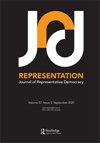代议制机构的合法性冲突:以法国气候公民公约为例
Q2 Social Sciences
引用次数: 3
摘要
本文章由计算机程序翻译,如有差异,请以英文原文为准。
Conflicts of Legitimacies in Representative Institutions: The Case of the French Citizen Convention for Climate
ABSTRACT Conceived as an alternative form of democratic representation, the random selection of citizens for a political task comes in tension with the logic of electoral representation. The idea, carried by random selection, that anyone can be a good enough representative challenges the assumption that we need to choose the most competent among ourselves. And the fact that citizens’ assemblies are sometimes tasked to draft legislation may undermine the authority of elected representatives. This article tests this hypothesis of tension between competing forms of representation on a recent case: the French Citizen Convention for Climate (CCC) in 2020. Drawing on parliamentary hearings and questions as well as public political reactions to the CCC, we find indications that elected representatives may feel threatened in their legitimacy even when most randomly selected citizens do not see themselves as representatives. This may be due to the fact that the CCC was seen by some as stepping on the prerogatives of the Parliament. This suggests that future experiments of the sort could benefit from a clearer functional division between the two forms of representation.
求助全文
通过发布文献求助,成功后即可免费获取论文全文。
去求助
来源期刊

Representation
Social Sciences-Sociology and Political Science
CiteScore
3.50
自引率
0.00%
发文量
31
期刊介绍:
This change in scope follows two paths. Firstly, it seeks contributors who are interested in exploring the interface between democratic practice and theory. In particular, this focus seeks contributions that apply theoretical insights to actual examples of current practice. Secondly, while not neglecting the current focus of the journal, we would like to expand its international coverage so that the journal will offer our readers insights in the state of democracy worldwide.
 求助内容:
求助内容: 应助结果提醒方式:
应助结果提醒方式:


